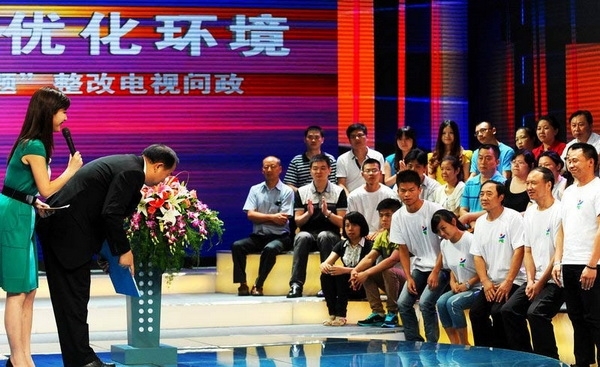


By Cheng Jiulong (程久龙)
Issue 583, August 27, 2012
Nation, page 11
Translated by Tang Xiangyang
Original article: [Chinese]
On the evening of Aug 14, Hubei provincial officials sat at the Jinzhou TV Station (荆州电视台), getting grilled by their constituents.
The topic was “Agriculture, Village and Farmers.” Several clips of undercover investigations were broadcast, revealing problems and embarrassing the officials. The program was a follow-up to Wuhan City’s trial TV show that first put officials on the hot seat.
“Compared to Wuhan’s trial, the provincial program is at a higher level,” said Liu Shijun (刘时俊), head of the Hubei Province Inspection Office. It was the first time for provincial officials to be challenged on a live TV program.
Other cities are following Wuhan’s lead in trying to promote government accountability and transparency through this kind of TV program. One month after the Wuhan pilot, Huangshi City - also in Hubei - produced a program where the deputy mayor and six other officials were questioned. Issues like construction the dumping of waste, unrepaired roads and police vehicles impeding traffic were raised.
Five days later, another Hubei city, Xiangyang, saw its deputy mayor, officials and heads of three local public hospitals appear on a live TV program where they answered questions from residents about medical reform. The cities of Luoyang in Henan Province and Qingdao in Shandong Province have also followed suit.
Still, the peak thus far for this type of program had to be the Aug 14 Hubei broadcast that featured 11 provincial officials. Aside from the live TV broadcast, the episode also went on the internet and radio to make it more accessible. Many officials looked embarrassed or surprised. Some admitted that they had done a “poor job” and promised to “deal immediately with the problems that had been revealed” in the undercover reports.
“The program is just a starting point, said Che Yangao (车延高), secretary of Wuhan’s Discipline Inspection Commission of the CPC committee. “We hope it may generate a larger impact.”
He said in the future, a regular long-term mechanism for residents to communicate with government needs to be established.
Wuhan is planning to expand the coverage of the TV program beyond just agency heads and party secretaries.
“We might have a new program monitoring lower-level officials,” said Wu Zhongxin (吴忠新), deputy director of the Publicity and Education Office under the Discipline Inspection Commission. “The frequency also might be increased to once per month, or even once per week. Currently, we’re just planning. It’s not settled.”
But it’s not easy to make these shows a regular fixture. The human, financial and material costs of each episode are surprisingly high, between the prep-work involved with the investigative reports and setting up the live broadcast. Liu Shijun said the program involving provincial officials had over 200 people working on it. “The investment is no less than that for an elaborate TV gala,” said Song Zhixiong (宋志雄), the program’s producer.
The greater problem though is reluctance to participate on the part of officials. They’ll usually only cooperate when their superiors formally require them to.
Though it’s a live program, the topics of both the undercover investigations and the in-studio questions are carefully selected. The TV station wants to make sure the program is politically “safe” but it also wants to avoid trivial questions.
There’s also currently no follow-up mechanism that checks to see if officials have actually done what they promised on the program. The Government Accountability Office (治庸问责办公室) has conducted some undercover investigations to see the effects of the program, but they were arbitrarily conducted and not conclusive.
The local government is considering establishing a third party to supervise whether those officials have followed through on their promises. Earlier in August, Hubei’s Discipline Inspection Commission under the local CPC committee and the provincial Bureau of Statistics co-founded an “anti-corruption public survey center.”
Though it will conduct investigations, analysis, research and preliminary judgment to constrain corruption, it’s not really an independent third-party. It actually belongs to the provincial Bureau of Statistics.
“It’s a public, semi-official institution,” said Ye Qing (叶青), deputy director of the bureau.
In the future, the government might consider a truly independent “third-party” to monitor government.

